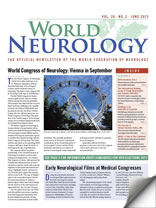 It is a great honor to participate as a candidate for a World Federation of Neurology (WFN) elected trustee. I am professor of Neurology, dean of the School of Medical Sciences at the National Autonomous University of Honduras (UNAH) and WFN regional director for Latin America. I got my MD degree at the UNAH, I made my neurology training at the National Institute of Neurology in Mexico, and the pediatric and adult epileptology/neurophysiology training at the Saint Paul Center and the Aix-Marseille University, France, and later at the University of California, Los Angeles (UCLA).
It is a great honor to participate as a candidate for a World Federation of Neurology (WFN) elected trustee. I am professor of Neurology, dean of the School of Medical Sciences at the National Autonomous University of Honduras (UNAH) and WFN regional director for Latin America. I got my MD degree at the UNAH, I made my neurology training at the National Institute of Neurology in Mexico, and the pediatric and adult epileptology/neurophysiology training at the Saint Paul Center and the Aix-Marseille University, France, and later at the University of California, Los Angeles (UCLA).
We founded with the support of the WFN the Honduras Neurology Training program, a WFN pilot program. By 2012, the program has resulted in a 50 percent increase in the national neurologist ratio per inhabitant, significantly improved the quality of patient care and promoted research in the neurosciences. This program has provided a valuable model for other developing countries with similar needs for neurological care
My main research activities are related to the epilepsy genetic, neuro-epidemiology and vascular endothelium. We have co-discovered the EFHC1 juvenile myoclonic epilepsy gene and the GABRB3 childhood absence epilepsy gene, and we established a community epilepsy intervention program in Salama, Honduras, where we reduced the rate of epilepsy from neurocysticercosis (NCC). I have published more the 111 peer-reviewed publications, 30 book chapters and served as editor of five books. I am editorial member/ reviewer of several journals (International Stroke Journal, Neurociencias, Revista Neurologia, Epilepsia, Journal of Neurological Sciences, etc).
In the last 14 years, I served as member of the WFN Education Committee, and in March 2012, I was elected the WFN regional director for Latin America. We are working with Gustavo Roman and Ana Robles on the Latin America Initiative as well as on the organization and foundation of the Pan American Federation of Neurological Societies (PAFNS), and on March 20, 2013, national delegates from the continent evaluated the PAFNS constitution and bylaws in San Diego.
The WFN is the international body representing the specialty of neurology in more than 100 countries/regions of the globe. My main goals and objectives for the WFN are:
• Neurology education in developing countries represents a challenge due to the myriad socio-economic and structural problems these countries are facing. My primary goal will be to assist low-resource countries in providing meaningful education for its neurologic health care providers and thus improve the neurologic health of its citizens.
• One of the major barriers to the provision of quality care for patients with neurological disorders in developing countries is a low ratio of neurologists per inhabitants. The World Health Organization recommends one neurologist per 100,000. To counteract the effects of the emigration of neuroscientists to countries with more resources (“brain drain”), I will support the principle of training neurologists in their native countries. The primary strategy is to help countries develop their own training programs.
• Neurology education must be tailored for each country or region. The educational needs of developing countries are not satisfied with programs established for industrialized nations, and education programs must be organized around the individual epidemiological profile. We can promote the south-to-south educational approach to train neurology experts, subregional educational activities and virtual educational activities among others.
• To develop and promote regional neurology academies and regional federations of neurological societies.
• Neurological disorders are the greatest threats to public health; we need to promote the public awareness.
• To improve the collaboration with the World Health Organization and other international neurological organizations such as ILAE, WSO, etc.
• Promote research: It is crucial to develop basic and clinical research worldwide.
